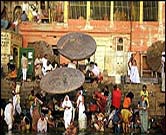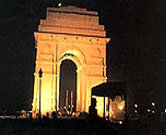
| Lets Go To India | Letsgotoindia.com: offers tour package including - north india cultural tour, north india pilgrimage tour, north india adventure tour, north india travel guide and many more... |
 |
| Distance Calculator |
North India Pilgrimage Tourr >> Varanasi
Gangaes Tour
|
|
North India Pilgrimage Tour Varanasi Gangaes Tour | Buddhist Temple Tour | Haridwar Temple Tour Vaishno Devi Yatra | Kumbh Mela Tour Varanasi Gangaes TourDasaswamedh Ghat  The name of Dasaswamedh Ghat indicates that Brahma sacrificed (medh) 10 (das) horses (aswa) here. Conveniently central, it's one of the most important and busiest ghats and therefore is a good place to linger and soak up the atmosphere. Note its statues and the shrine of Sitala, goddess of smallpox. Tulsi Ghat Tulsi ghat is named after the famous 16th century poet Tulsidas, who spent many years here composing the Ramcharitmanas. His manuscript, it is said, floated instead of sinking in the Ganga. The first performance of Ramlila was held here. A temple of Ram stands on the ghat. The house in which the poet died preserves his samadhi, his wooden clogs, pillow and the idol of Hanuman which he worshipped. There is also a piece of wood from the boat used by him to cross the Ganga. Dandi Ghat The Dandi Ghat is the ghat of ascetics known as Dandi Panths. The spartan Hanuman ghat is used by wrestlers and body builders for whom Bajrangbali (Hanuman) is the patron God. Saint Vallabhacharya lived here. Kedar Ghat Kedar Ghat built by the Maharaja of Vijayanagar in the South is named after Shiva, who dwells in the middle of the spacious temple.This ghat is shrine popular with Bengalis and south Indians. A little below is the Gauri (Parvati) kund whose waters have healing properties. Mansarowar Ghat Mansarowar Ghat was built by Raja Man Singh of Amber and named after the Tibetan lake at the foot of Mt. Kailash, Shiva's Himalayan home. Manikarnika Ghat Manikarnika Ghat,one of the oldest and most sacred in Varanasi. Manikarnika is main burning ghat and one of most auspicious places that a Hindu can be cremated. Bodies are handled by outcasts known as doms, and they are carried through alleyways of old city to the holy Ganges on a bamboo stretcher swathed in cloth. The corpse is doused in Ganga prior to cremation. You will see huge piles of firewood stack along the top of the ghat, each log carefully weighted on giant scales so that the price of cremation can be calculated. There are no problems watching cremations, since at Manikarnika death is simply business as usual, but don't take photos and keep your camera well hidden. Dattatreya Ghat Dattatreya Ghat bears the footprint of Brahmin saint of that name in a small temple nearby. Panchganga Ghat  Panchganga Ghat as its name indicates, is where five rivers are supposed to meet. Dominating the ghat is Aurangazeb's smaller mosque, also known as the Alamgir Mosque, which he built on the site of large vishnu temple erected by the Maratha chieftain Beni Madhav Rao Scindia. Man Mandir Ghat This ghat was built in 1600 but was poorly restored in the 19th century. The northern corner of the ghat has a fine stone balcony and Raja Jai Singh of Jaipur erected one of his unusual observations on this ghat in 1710. Harishchandra Ghat The Harishchandra Smashan Ghat is a secondary burning ghat. It is one of the oldest ghats in city. Assi Ghat The Assi Ghat is one of the five special ghats which pilgrims are supposed to bathe at in sequence during the ritual route called Panchatirthi Yatra. Trilochan Ghat The Trilochan Ghat has two turrets merging from the river, and was water between them is especially holy. Bachraj Ghat The Bachraj Ghat is a Jain and there are three riverbank Jain Temples. Many of ghats are owned by Maharajas or other princely rulers, such as the very fine Shivala Ghat owned by the maharaja of Varanasi. Click Here for - Varanasi Ganges Tour Booking |